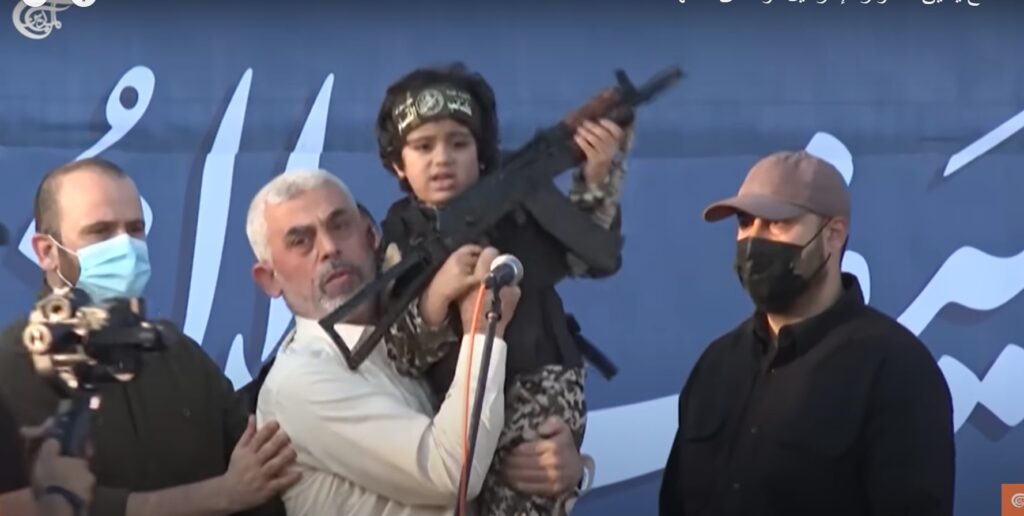Strategic Blow to Hamas and Iran’s Shiite Axis
The assassination of Yahya Sinwar, a top Hamas figure in Gaza, is a strategic setback for both Hamas and Iran’s broader regional ambitions.
Senior political officials suggest his death opens new avenues for Israel, creating a potential opportunity to negotiate the release of hostages and push for an end to the conflict in Gaza.
Sinwar’s actions have brought another “Nakba” upon the Palestinians in Gaza and dragged the Middle East to the edge of a regional war.
Israeli security officials believe that with Sinwar gone, Hamas’ decision-making will shift to its external leadership, which may consider a hostage deal with Israel.
Changing Leadership in Gaza
Within Hamas, Muhammad Sinwar, Yahya’s brother and the successor to Muhammad Deif as head of Hamas’ military wing, is now the leading figure in Gaza.
Alongside him are Ezz ad-Din Al-Hadad, commander of the Gaza Brigade, and Muhammad Shabana, head of the Rafah Brigade—both part of the remaining military leadership after Israel’s targeted assassinations.
Strategic Miscalculation
Yahya Sinwar’s decision to launch the “Al-Aqsa Flood” operation on October 7, initially seen as a great strategic success, has backfired spectacularly.
Instead of weakening Israel, Sinwar’s offensive complicated the broader “axis of resistance” led by Iran.
Israel turned the tables, undermining Iran’s frontline defenses in the region.
Hezbollah, under Hassan Nasrallah, was Iran’s primary deterrent against Israeli attacks, but Israel successfully eliminated Nasrallah and much of Hezbollah’s military elite, according to Defense Minister Yoav Gallant.
With two-thirds of Hezbollah’s missile arsenal destroyed, Iran’s defensive strategy lies in tatters.
A Vulnerable Iran
According to senior Israeli security officials, the Iranian regime now faces direct threats from Israel’s air force and can no longer rely solely on its proxies for protection.
As Iran nears the final stages of its nuclear program, the conflict initiated by Sinwar jeopardizes its continuation.
Israel now has international legitimacy to strike Iran, especially after enduring two rounds of ballistic missile attacks from Iranian forces.
Though an attack on Iran’s nuclear sites may not be imminent, Israel’s broader campaign against Iran’s resistance axis will likely continue.
Israel could target Iran’s ballistic missile stockpiles, which pose a direct threat.
A successful airstrike on Iran’s missile sites would deal a severe blow to its strategic capabilities and weaken its proxies in Iraq, Syria, and Yemen.
Iran’s Regional Influence Crumbles
Iran’s strategy to weaken Israel through the “axis of resistance” has backfired, especially following the collapse of Hezbollah in Lebanon, once its strongest proxy.
With Hezbollah’s downfall, Iran’s influence over Lebanon’s political system is also set to diminish.
As Israel dismantles Hamas’ military wing and prepares for operations against Hezbollah, Iran’s power in the Palestinian arena has drastically declined.
Now, Iran’s only significant footholds remain in Yemen through the Houthis and in Iraq and Syria via Shiite militias.
An Unintended Regional War
Yahya Sinwar’s reckless attack on October 7 undermined the strategic foundation Iran had built over decades.
Iran originally intended a war of attrition that would slowly weaken Israel, allowing it to complete its nuclear project.
However, Sinwar’s actions dragged Iran into a direct conflict with Israel, putting its most critical asset—the nuclear program—at risk.
Rather than its proxies shielding it from Israeli attacks, Iran now finds itself in a position where it must protect them.
The situation has dramatically shifted, and Iran is left dealing with the unintended consequences of Yahya Sinwar’s gamble.




